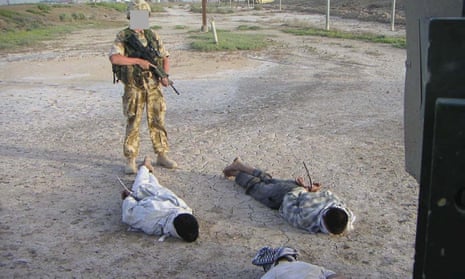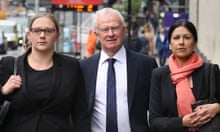Nearly 300 British veterans of the Iraq war have been warned they are named by official investigators, amid claims of murder, torture, and abuse.
The documents have been sent by the Iraq Historic Allegations Team (IHAT), a unit led by Mark Warwick, a former senior police detective, and set up after claims of systemic brutal treatment of Iraqi detainees.
Warwick has also sent reports to Andrew Cayley QC, director of the Service Prosecuting Authority (SPA) - the military equivalent of the Crown Prosecution Service.
Now, Leigh Day, the law firm representing hundreds of Iraqis claiming abuse and unlawful detention by British troops, has been referred to the Solicitors Disciplinary Tribunal.
And the defence secretary, Michael Fallon, has criticised “ambulance-chasing British law firms” inhibiting soldiers on the battlefield for fear they would be hauled before the courts.
Claims and denials about the abuse and killing of Iraqi detainees are swirling around in ugly recriminations, yet another example of the legacy of the 2003 invasion of Iraq.
Chilcot is unlikely to refer to them in his report, due to be published in the summer, though they are some of the many consequences of the ill-conceived invasion and the rush to war for which British troops were unprepared.
IHAT is investigated the cases of more than 1,500 possible victims, 280 of whom are alleged to have been unlawfully killed.
Cayley, a former war crimes prosecutor, says he will give the cases the “thorough scrutiny the law requires” and if prosecution was warranted he would not “flinch” from proceeding.
However, he added: “Equally I want to make it absolutely clear that no member of the British armed forces will be prosecuted unless there is sufficient evidence to do so.”
10 Downing Street has entered the fray, saying David Cameron feared that people were being “solicited by lawyers” enticing them into making accusations. Cameron was “deeply concerned” that Iraq war veterans could face threats of prosecution due to “fabricated” or “unjustified” claims of misconduct, it said.
After complaints by the Ministry of Defence, Leigh Day has been referred to the Solicitors Disciplinary Tribunal. The main allegation involves a document that identified nine Iraqis, detained after what became known as the Battle of Danny Boy in May 2014, as members of the Mahdi Army Shia militia.
A Leigh Day spokesman said: “We refute all of the allegations that have been made against us”. The firm added that the great majority of the claims it has brought against the MoD have been successful.
The complaint follows the al-Sweady inquiry, set up to investigate claims that British troops tortured and murdered Iraqis.
It concluded that the most serious allegations against UK troops were “deliberate lies, reckless speculation and ingrained hostility”, criticism which encouraged an already furious MoD to have a go at Leigh Day, and Public Interest Lawyers (PiL) the law firms which represented the Iraqis.
Yet the al-Sweady inquiry could have been avoided if the MoD had come clean in the first place. All it needed to do was explain why bodies of dead, mutilated, and wounded, Iraqis were taken after the battle to a nearby British base before being handed over to their families.
(British officers said they wanted to see if the suspected leader of a gang of insurgents which killed British military policemen in cold blood nearby a year earlier was among the dead or captured at Danny Boy.)
Instead, in what high court judges described as “lamentable” behaviour and serious breaches of its duty of candour, the MoD mounted an unnecessary cover-up, even claiming that documents previously made public were secret.
An earlier inquiry concluded that the death of the Iraqi hotel worker Baha Mousa in 2003 was caused by “an appalling episode of serious gratuitous violence” orchestrated by British soldiers.
In a devastating indictment, it blamed the MoD’s “corporate failure” for the use of banned interrogation methods in Iraq.
Yet that inquiry would not have happened without the human rights lawyers now so vilified by the MoD.
And the MoD has paid out more than £20m in compensation to more than 300 Iraqi civilians as a result of cases brought by Leigh Day and Public Interest Lawyers.
The International Criminal Court is also considering more than 1,000 allegations of war crimes involving British troops in Iraq.
But despite the plethora of allegations and investigations - more than 1,000 cases before IHAT, more than 1,000 allegations before the ICC - it is unlikely that any British soldier or veteran will be successfully prosecuted, as unlikely as the prospect of Paras being successfully prosecuted for shooting unarmed civil rights marchers on Bloody Sunday, more than 40 years ago in Northern Ireland.









Comments (…)
Sign in or create your Guardian account to join the discussion